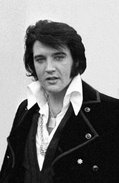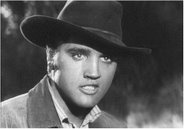 According to Rolling Stone magazine, "it was Elvis who made rock 'n' roll the international language of pop." A PBS documentary described Presley as "an American music giant of the 20th century who single-handedly changed the course of music and culture in the mid-1950s." His recordings, dance moves, attitude and clothing came to be seen as embodiments of rock and roll. His music was heavily influenced by African-American blues, Christian gospel, and Southern country.
According to Rolling Stone magazine, "it was Elvis who made rock 'n' roll the international language of pop." A PBS documentary described Presley as "an American music giant of the 20th century who single-handedly changed the course of music and culture in the mid-1950s." His recordings, dance moves, attitude and clothing came to be seen as embodiments of rock and roll. His music was heavily influenced by African-American blues, Christian gospel, and Southern country.Presley sang both hard driving rockabilly, rock and roll dance songs and ballads, laying a commercial foundation upon which other rock musicians would build their careers. African-American performers like Little Richard, Fats Domino, and Chuck Berry came to national prominence after Presley's acceptance among mass audiences of White American teenagers. Singers like Jerry Lee Lewis, the Everly Brothers, Buddy Holly, Johnny Cash, Roy Orbison and others immediately followed in his wake. John Lennon later observed, "Before Elvis, there was nothing."
During the post-WWII economic boom of the 1950s, many parents were able to give their teenage children much higher weekly allowances, signaling a shift in the buying power and purchasing habits of American teens. During the 1940s bobby soxers had idolized Frank Sinatra, but the buyers of his records were mostly between the ages of eighteen and twenty-two. Presley triggered a juggernaut of demand for his records by near-teens and early teens aged ten and up. Along with Presley's "ducktail" haircut, the demand for black slacks and loose, open-necked shirts resulted in new lines of clothing for teenage boys whereas a girl might get a pink portable 45 rpm record player for her bedroom. Meanwhile American teenagers began buying newly available portable transistor radios and listened to rock 'n' roll on them (helping to propel that fledgling industry from an estimated 100,000 units sold in 1955 to 5,000,000 units by the end of 1958). Teens were asserting more independence and Presley became a national symbol of their parents' consternation.
Presley's impact on the American youth consumer market was noted on the front page of The Wall Street Journal on December 31, 1956 when business journalist Louis M. Kohlmeier wrote, "Elvis Presley today is a business," and reported on the singer's record and merchandise sales. Half a century later, historian Ian Brailsford (University of Auckland, New Zealand) commented, "The phenomenal success of Elvis Presley in 1956 convinced many doubters of the financial opportunities existing in the youth market." Elvis even became very popular to British audiences as well.






No comments:
Post a Comment